Notable feats and failures make 8 significant impressions at 2024 Tour de France Femmes
From the decisive four seconds on Alpe d'Huez to Charlotte Kool’s duo of triumphs and Justine Ghekiere’s stunning win to Le Grand-Bornand
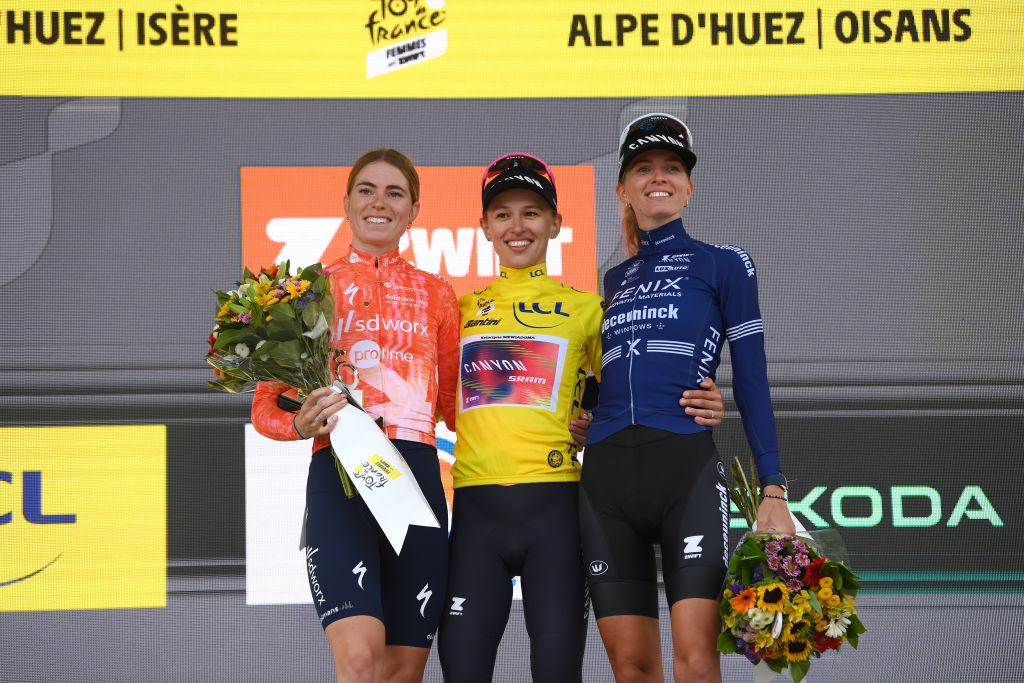
The third edition of the Tour de France Femmes lived up to the hype, with the spoils of eight stages divided among six individual winners, including two stages compressed into one day. From the fast, low-lying plains of the Netherlands to the punchy climbs of the Ardennes Classics in Belgium and finally to the mountainous peaks of the Alps, the 946.3 kilometres of racing came down to precious seconds to determine the maillot jaune.
Two of the best from last year’s race fought for podium spots again, this time on the epicentre of European climbing on the Alpe d’Huez, defending champion Demi Vollering (SD Worx-Protime) took her second stage victory of the week on the fabled ascent, but would ultimately fall short by four seconds to new champion Kasia Niewiadoma (Canyon-SRAM), who improved from last year’s third overall finish.
Most significant was that the GC was decided by the smallest margin of victory in Tour de France history, since Greg Lemond defeated Laurent Fignon by eight seconds in the 1989 men’s race.
It wasn’t just about two riders battling on Sunday across the 21 switchbacks either. There were plot twists each day in breakaways, classification leads and moments to define careers, as well as give home crowds several reasons to turn out in big numbers and name new heroes. It had been since 1991 that two stages were packed into one day at a Tour de France, this year's race contesting a road race and an ITT on the second day.
Cyclingnews had a strong contingent covering the Tour de France Femmes from start to finish, including Deputy Editor Kirsten Frattini, News Writer James Moultrie and contributor Lukas Knöfler. Here are our choices of the most memorable moments and conclusions from the race.
Charlotte Kool's wins were no fluke
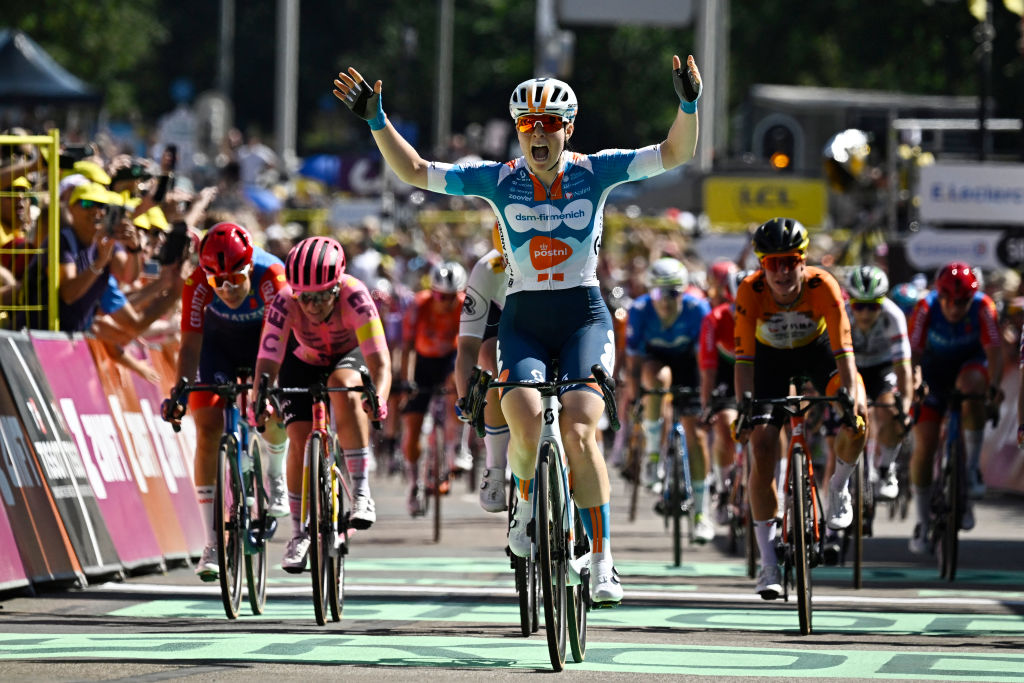
Before the 2024 Tour de France Femmes, Lorena Wiebes was not only the favourite for the opening two stages in the Netherlands but also the undisputed best sprinter in the world. But things didn’t go to plan on the opening stage to The Hague, when late contact with Anniina Ahtosalo before the sprint saw Wiebes’ rear derailleur come off, leaving her unable to contest the sprint.
Emerging from the bunch to take the win and with it the first yellow jersey, was Charlotte Kool (DSM-Firmenich PostNL), the sprinter who used to be Wiebes’ final lead-out rider and the only rider who had really matched her compatriot for top-end speed in the past season and a half.
Get The Leadout Newsletter
The latest race content, interviews, features, reviews and expert buying guides, direct to your inbox!
This could have seemed like a fluke at the time, but Kool explained how a breathing problem had been holding her back throughout the 2024 season, leading Wiebes to enter the Tour with 18 wins while Kool had netted just one this season, and on the second sprint, she confirmed it was her strength, not Wiebes’ bad luck that led her to victory.
Wiebes tried to bounce back in Rotterdam after a strong lead-out by Barbara Guarischi, but Kool wasn’t too far back just on the wheel of Marianne Vos. When Wiebes hit the front, there wasn’t the usual separation she has at lift-off, but a yellow jersey instead getting up to her and around her before the line. The doubling up on wins confirmed that Kool was every bit Wiebes’ equal in a flat finish, if not stronger.
It’s a sprint battle that we should see continue into the next few seasons from the former teammates, however, for now, Kool will hold that crown and be confident for each of her next meetings with Wiebes. Women’s sprinting has two stars.
Prestige of the Tour breeds unexpected winners
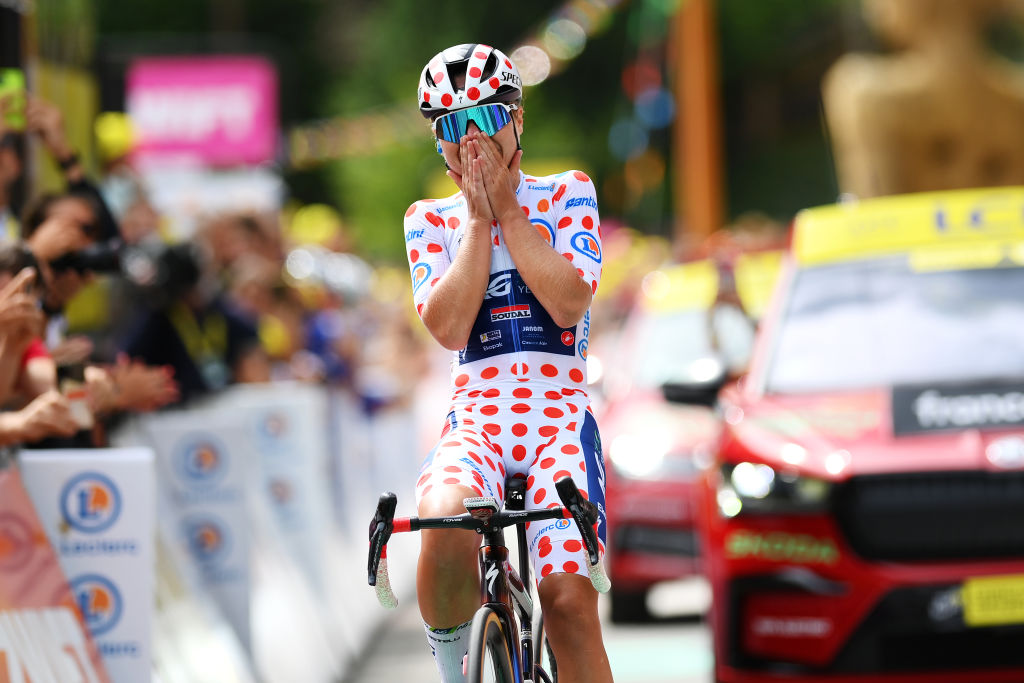
One of the most intriguing things the Tour de France Femmes has led to since its inception in 2022, is a number of surprising winners. That continued and then some at the 2024 edition of the race, right through from Kool’s duo of triumphs ahead of Wiebes to Justine Ghekiere’s (AG Insurance-Soudal) stunning solo win from the break to Le Grand-Bornand.
The Dutch Grand Départ actually had three surprise wins, with Demi Vollering (SD Worx-Protime) also producing a stunning individual time trial on the 6.3km stage 3 course to move into the yellow jersey. The Course was expected to be one for the sprinters or for the pure TT specialists, but not a GC favourite due to the mainly flat profile.
But neither Chloé Dygert (Canyon-SRAM) nor Kristen Faulkner (EF-Oatly-Cannondale) was able to put in better performances than Vollering, who made up all her time in the final 3km of the course, as the lactic acid built up in the legs for the specialists over the Erasmusbrug bridge. She would win by five seconds ahead of the ITT World Champion Dygert in a huge shock.
This theme didn’t end there, with Vollering herself then being stunned by Puck Pieterse (Fenix-Deceuninck), who enjoyed a terrific debut at her first-ever stage race, topped off by her victory into Liège on stage 4 ahead of the defending champion - in a photo finish no less.
As the race finally hit France for stage 5, three consecutive surprise winners arrived at the line: Blanka Vas (SD Worx-Protime), Cédrine Kerbaol (Ceratizit-WNT) and Ghekiere. Vas triumphed in a sprint on the drama-filled day to Amnéville, where teammate Vollering crashed and lost yellow, while Kerbaol produced a stunning descent and TT effort into Morteau to hold off the chasers, and Ghekiere went solo after getting into the days early break on the first real mountain stage.
There’s something special about the Tour and the extra motivation it can give riders, being a common theme throughout the 121 years the men's race has existed and now making its way consistently into the women's race. The added power that chasing the glory of a Tour de France Femmes stage win can extract is not to be underestimated.
Two stages in one day is a logistical nightmare
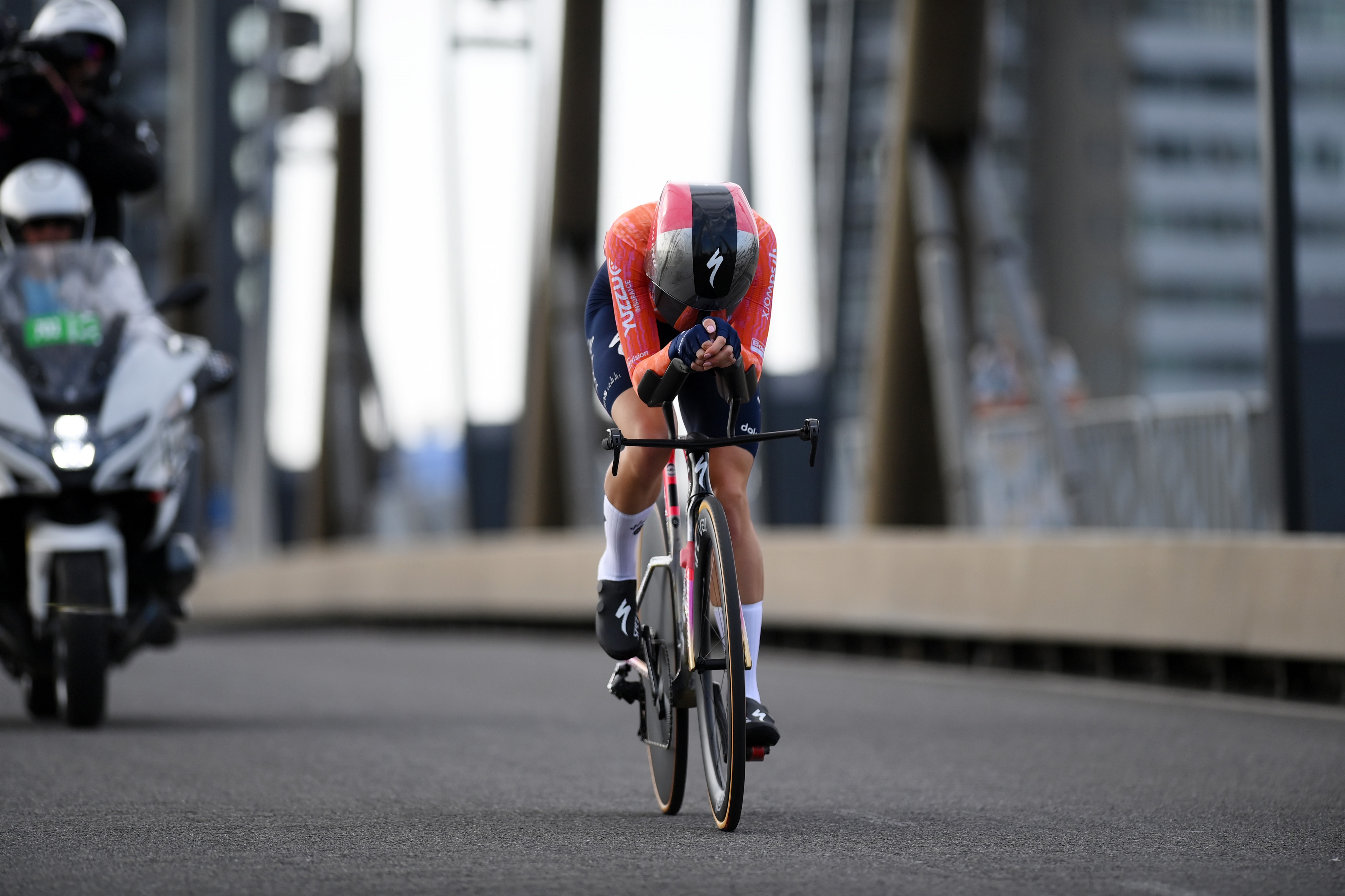
The Tour de France Femmes had good reason to host the double stage on day two, with the Dordrecht to Rotterdam sprint stage and the Rotterdam time trial allowing them to keep the race at eight stages as it had been for the previous two editions, all while fitting in with the Paris Olympics-altered calendar.
However, for riders, teams, mechanics, organisers and press, it can only be described as a massive headache. The teams had to be up early to make the Dordrecht start, with little time to comfortably make the journey to the finish after 66k of incredibly fast racing.
The problems started just there, as, after the sprint, the mechanics then had to work double time to ensure two sets of bikes - road and TT - were cleaned and set up properly for the race against the clock and the day after.
FDJ-SUEZ even booked another hotel for after the sprint, so their riders could get out of the 30-degree heat in the city, shower and prepare optimally for the time trial. It also meant that stress levels were higher and everyone had to do double the work for a normal stage.
Even for the press, there was confusion about whether cars would need to be moved to a different car park after the first stage, and the late finish of the time trial meant there was little time between the end of Vollering’s winner’s press conference and the press centre closing. Coverage was perhaps done half as well as it could have been had there been the normal one stage.
While it’s understandable why the organisers had to do it so the race didn’t shrink in size and so that spectators in Rotterdam had a double day of action on the same finish line, it perhaps shows why double stages haven’t been at any Tour, men’s or women’s since 1991.
SD Worx-Protime’s tactics continue as biggest weakness
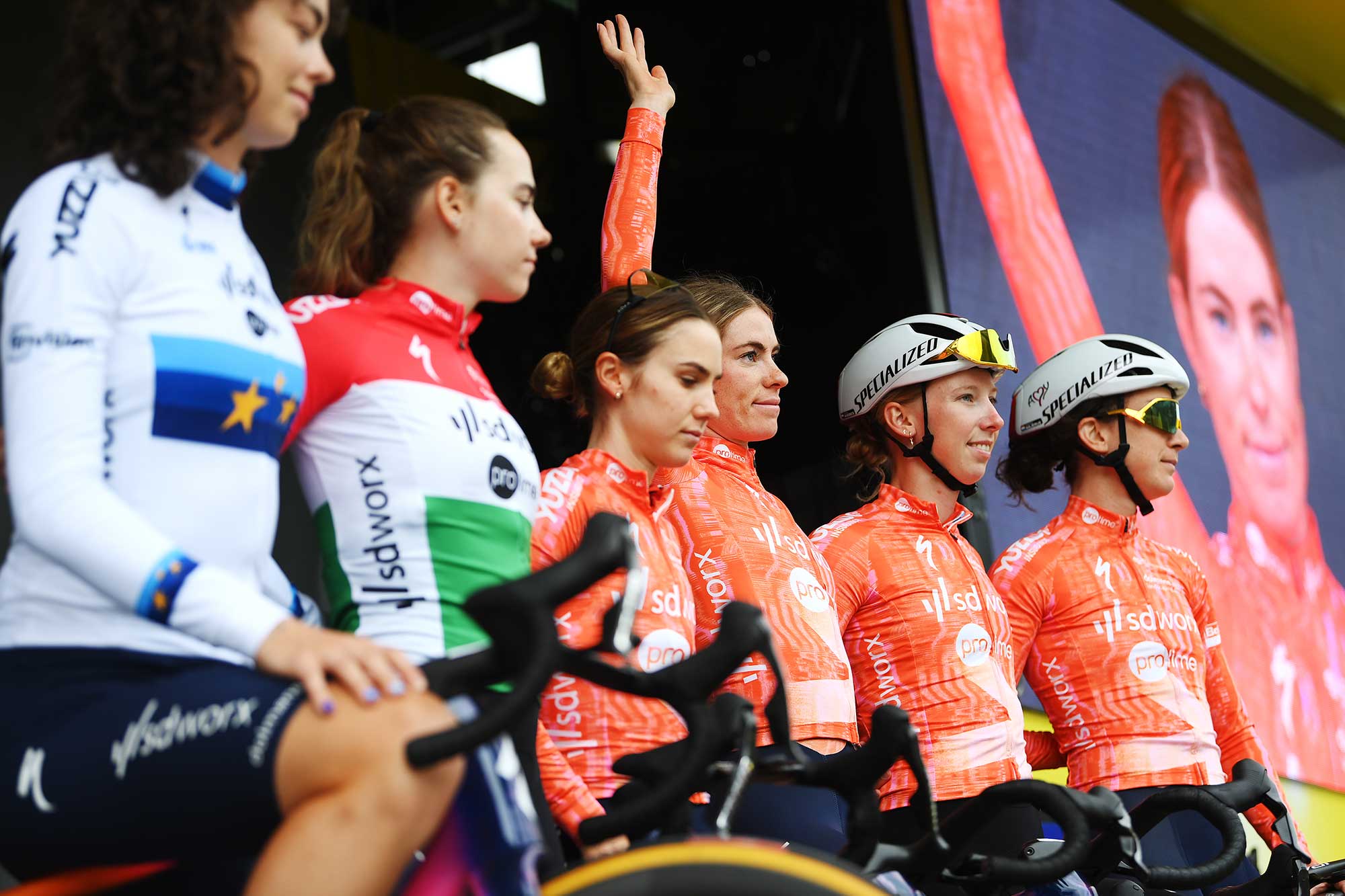
For the best team in women’s cycling, SD Worx-Protime’s biggest weakness continues to be themselves. With many of the best riders in the world and the top GC star in women’s cycling - Demi Vollering, they should have been able to retain their crown from 13 months ago, but a tactical error on stage 5 cost them the race.
Vollering’s crash on the approach to Amnéville will surely be looked at in years to come as the defining moment of this year’s race, with the subsequent response, or lack thereof, from SD Worx-Protime being the biggest mistake.
When the yellow jersey hits the deck with 6km to go, she should have been surrounded by teammates waiting to help her try and keep the jersey. But Vollering was instead alone, in pain and losing the Tour de France Femmes. Only Mischa Bredewold would drop back to help her after she finally remounted 49 seconds after going down on the exit to a roundabout, with teammate Blanka Vas winning the stage and Lorena Wiebes crossing the line eighth - neither dropped back to help their leader.
Sports manager Danny Stam said that team radios weren’t working and that there wasn’t much extra help would have done in the final approach to the line. But with a four-second margin now separating them from yellow, would SD Worx-Protime perhaps rethink their approach?
Even with Bredewold dropping back. She’d already been on the front trying to lead out Wiebes so she wasn’t fresh to save her teammate four seconds or more from the eventual 1:47 she lost to overall winner Niewiadoma. It was nothing short of a tactical disaster and perhaps vindicated part of why Vollering is rumoured to leave the team - they aren’t all in for her.
At that point, she was in the yellow jersey after a stunning stage 3 time trial and with the hardest mountain stages, that suited her better than anyone, still to come on stages 7 and 8. SD Worx-Protime simply weren’t tactically astute enough and it’s come back to bite them in the form of gruelling defeat.
Women’s riders are true icons
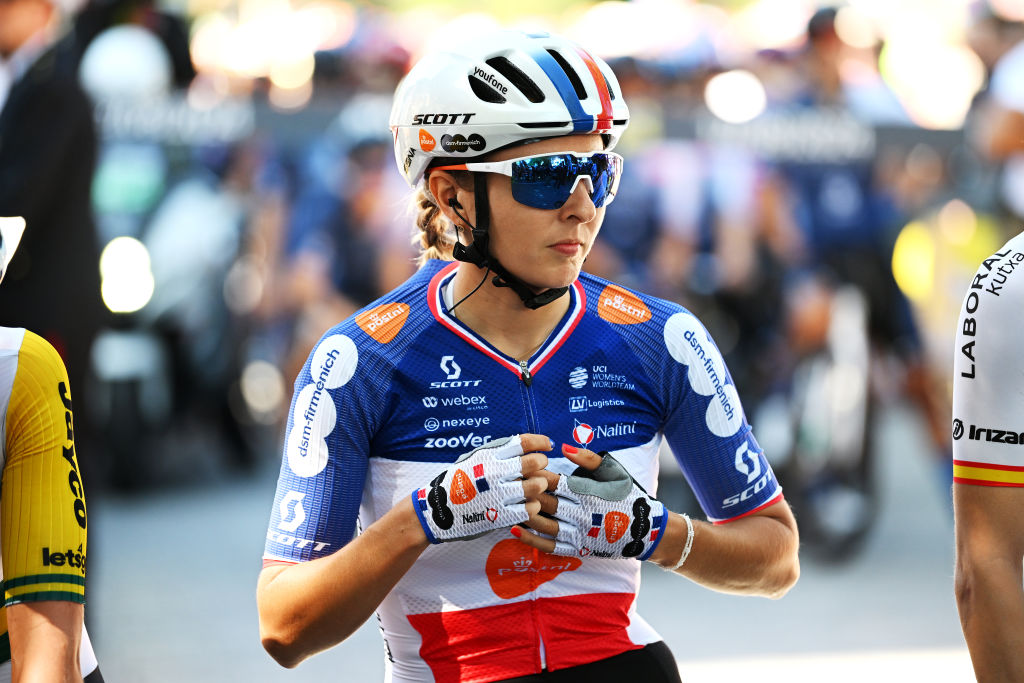
Having been introduced to men’s racing in 1952, Alpe d’Huez is finally set to see one of its fabled 21 bends marked with the name of a women’s rider, the winner of the final queen stage, Demi Vollering. The likes of Bernard Hinault, Gianni Bugno and Geraint Thomas have long been present on the bends, but now Vollering’s name will be etched and championed in the same way on the blue and white signs.
After rarely being seen in women’s racing having been a part of the 1992 and 1993 Tour Cycliste Féminin, where Dutch competitor Leontien Zijlaard-van Moorsel took victory twice, Vollering emulated her countrywoman and took victory, albeit a bittersweet one as she lost the overall.
But nonetheless, her victory up the climb and the grittiest of defences that followed it by yellow jersey Kasia Niewiadoma, will go down in history as one of cycling's closest but most incredible finishes, setting up Alpe d'Huez to feature as a historic climb for women as it has for men in racing.
Women’s stars being honoured on a corner was also a bit of a theme in this race, with the 'Virage' Juliette Labous coming to life on stage 6 to Morteau, as she raced in front of hundreds of fans lining the roads just to see and cheer her on.
Allez Juliette signs were everyone on the course as the race headed towards the finish, with Labous honouring the crowds with an attack that ultimately didn’t come off but showed just how heroic these riders are to the fans.
The various virages that have been seen recently are all from men’s racing - Thaibaut Pinot, Romain Bardet and Julien Bernard, with Labous now joining them in a special list of honoured riders.
Kerbaol’s win opens the door to more French success
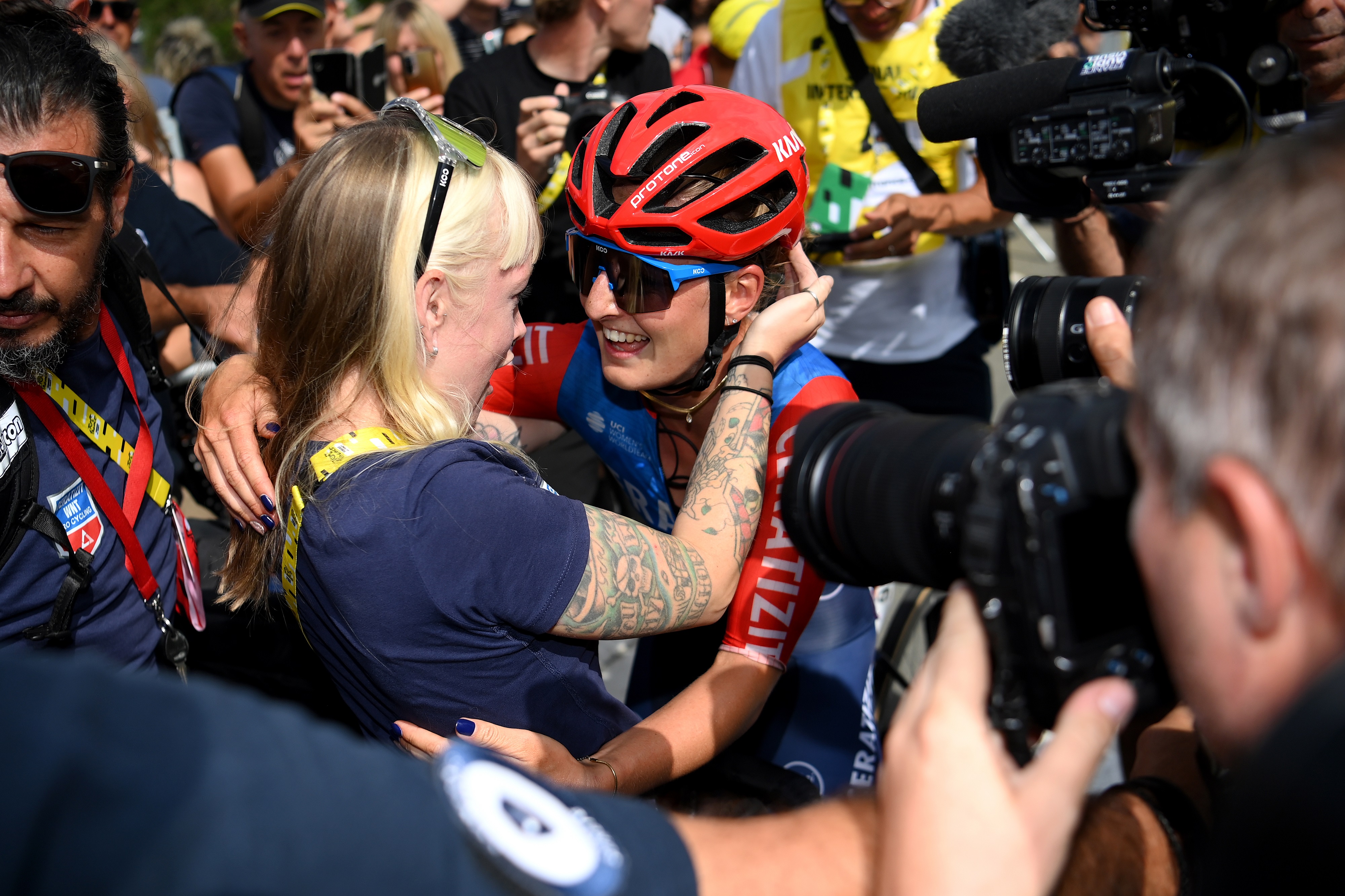
The first two editions of the Tour de France saw the Dutch dominate most of the stages, be that the sprints or the high mountains, with little success coming from the French outside of Cédrine Kerbaol’s success in the best young rider’s classification last year.
So it was very fitting that after a Dutch-dominated Grand Départ in the Netherlands, France finally found its first home stage winner, since the women’s Tour was revived in 2022 through, Kerbaol again.
It was an opportunistic move by the 23-year-old into Morteau, with her launch coming off the back of the GC favourites Vollering and Niewiadoma marking each other out on the final climb up Côte des Fins. She followed it up with a daring descent on roads she knew well, railing each corner on the absolute limit before time trialling her way to the line.
It felt huge for the French, with this now opening the door for more French stage wins to follow. Kerbaol embraced race director Marion Rousse at the finish, with her compatriot captioning a post to Instagram ‘forever the first’.
With lots of French talent on show at the race through Kerbaol, Labous and Muzic, who are all still young, the even younger generation of future stars like Marion Bunel and Celia Gery will be hoping to emulate what Kerbaol did at the 2024 Tour de France Femmes.
The race is ready for 9 days and more
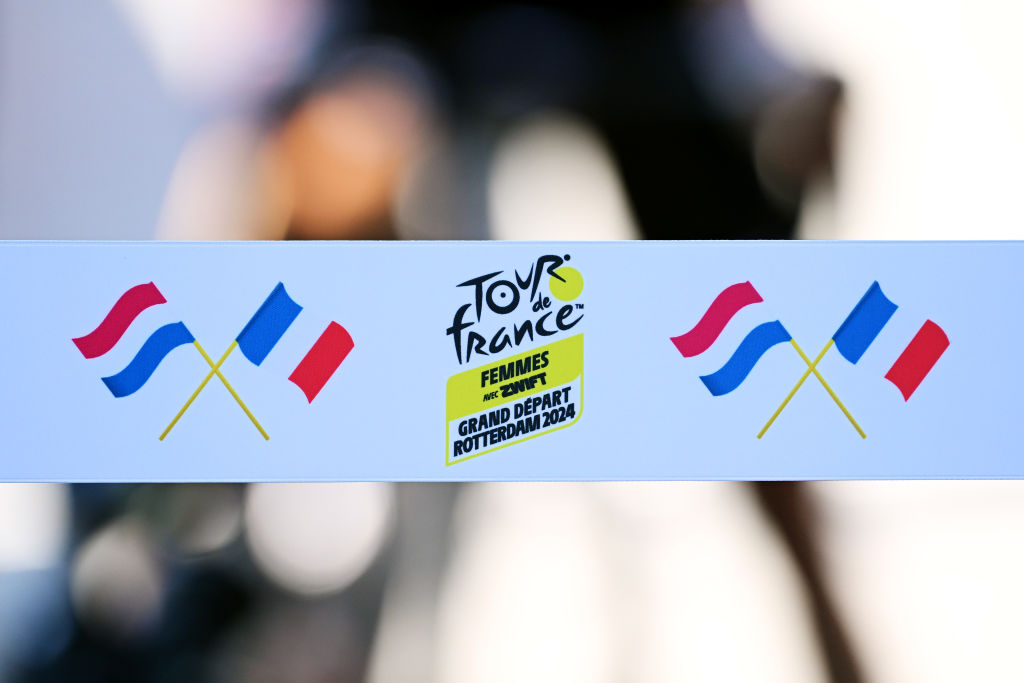
A four-second margin separated Demi Vollering and Kasia Niewiadoma at the finish of one of cycling’s greatest-ever finales, coming right down to the wire after a brutal week of racing. While it was exciting to witness the closest winning margin the Tour de France has ever seen, men’s or women’s, that is partly down to the race being only eight stages still.
With such a short ‘Grand Tour’ format, this puts higher pressure on each and every mistake made, especially for the GC riders. This was felt worst by Vollering of course, who after a crash on stage 5, saw her lead overall completely evaporated in the Amnéville heat.
While this is part of racing, and it makes the jeopardy higher in the women’s race, only having eight stages and seven days to win the Tour means there is little time to come back from a minor setback, caused by yourself or someone else accidentally.
Alongside this, the race has now experienced three great years of racing in different regions and it feels right to start expanding - albeit in small increments - so the proposed one extra stage for next year sounds about right. The 2025 race is due to start in Brittany and is scheduled to run for nine days based on the current information released by ASO, which means more of the great action.
Women’s races have also been much longer in the past, such as the old women’s Tours de France from the 80s and 80s and the women’s Giro d’Italia, which had 10 stages for a long time It’s not as if eight stages is a barrier the riders cannot handle, but a UCI limit. The stages are getting longer - 150km and over, the most famous climbs are now being used, so why not expand the race?
Niewiadoma and Canyon-SRAM rode the perfect race
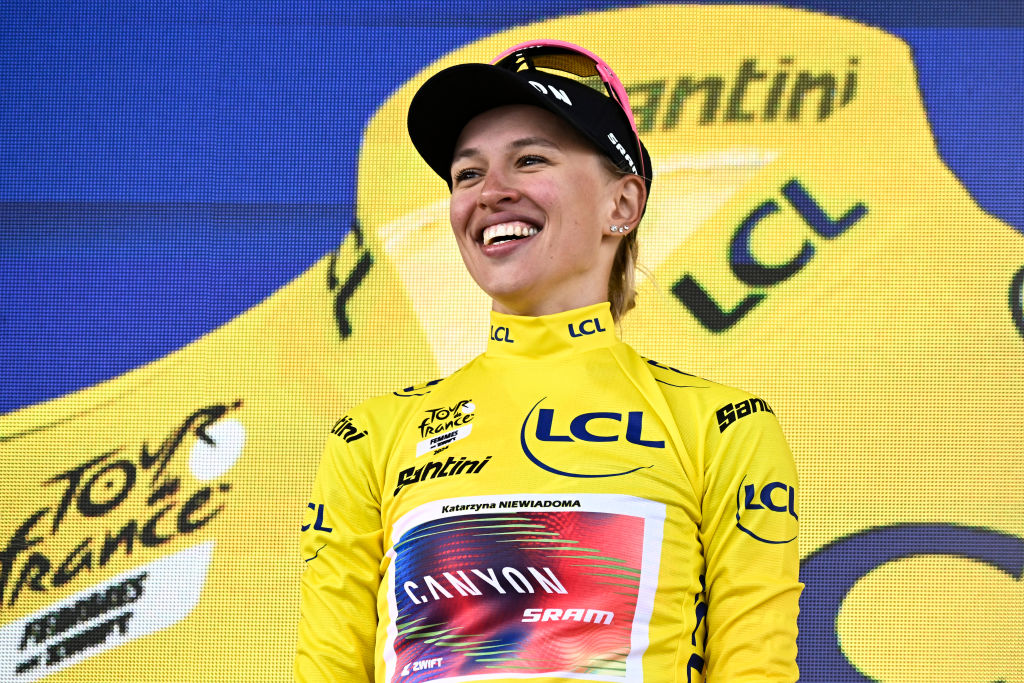
A lot of the focus since the end of the race has been on the mistakes made by SD Worx-Protime and Demi Vollering, however, it’s important to note just how brilliant Canyon-SRAM were in their pursuit of yellow.
Their language right from the pre-race media day was confident, spurred on by showing brilliant race tactics throughout the season such as at the Tour de Suisse where Kasia Niewiadoma and Neve Bradbury lit up the racing to try and beat Vollering to the top spot. On that occasion, they weren’t able to do it but they had their eyes on the bigger prize.
But losing Elisa Chabbey early on and Bradbury as a GC card to play due to crashes meant it had to be the Polish star who took the reigns and led the German team.
Niewiadoma, twice a third-place finisher at the Tour de France Femmes, had her full focus on Vollering and even identified that there were weaknesses in the Dutch squad’s roster without Lotte Kopecky and Marlen Reusser. And it was the crash and subsequent poor tactics that arrived on stage 5 which perhaps proved Niewiadoma’s point - they were vulnerable.
Canyon-SRAM then responded perfectly, putting time trial World Champion Chloé Dygert to work and letting the brutally powerful American do some serious damage on the front which maximised Niewiadoma’s time gain.
This ride put Niewiadoma into the lead with a 1:19 gap to Vollering, and despite many riders being in between them on GC, she knew that only the Dutch rider could fully challenge her now. Niewiadoma quickly changed tack from her usual attacking style and settled brilliantly into the role of defender, keeping Vollering close on stages 6 and 7 to only lose four seconds heading into the final stage.
Four seconds that she called insignificant post-stage 7, but close to 24 hours later, she was calling a different four seconds "magical" after that was all of her lead that remained following the queen stage to Alpe d’Huez. Niewiadoma produced the grittiest ride of her life, albeit with some help from Lidl-Trek and FDJ-Suez, defending a 1:01 gap for the final 54km of stage 8 up Col du Glandon and Alpe d’Huez to take victory.
Once the perennial bridesmaid of professional cycling but now the champion of the biggest race, Niewiadoma’s rise from serial second-place finisher and podium contender to winner is one that hasn’t come without the required hard work. It’s a win that will live on in the memory of cycling fans for an awful long time, as the closest margin of victory ever in a Tour de France.
Get unlimited access to all of our coverage of the 2024 Tour de France Femmes - including all the news and analysis reported by our journalists on the ground from every stage as it happened and more. Find out more.

James Moultrie is a gold-standard NCTJ journalist who joined Cyclingnews as a News Writer in 2023 after originally contributing as a freelancer for eight months, during which time he also wrote for Eurosport, Rouleur and Cycling Weekly. Prior to joining the team he reported on races such as Paris-Roubaix and the Giro d’Italia Donne for Eurosport and has interviewed some of the sport’s top riders in Chloé Dygert, Lizzie Deignan and Wout van Aert. Outside of cycling, he spends the majority of his time watching other sports – rugby, football, cricket, and American Football to name a few.
- Kirsten FrattiniDeputy Editor